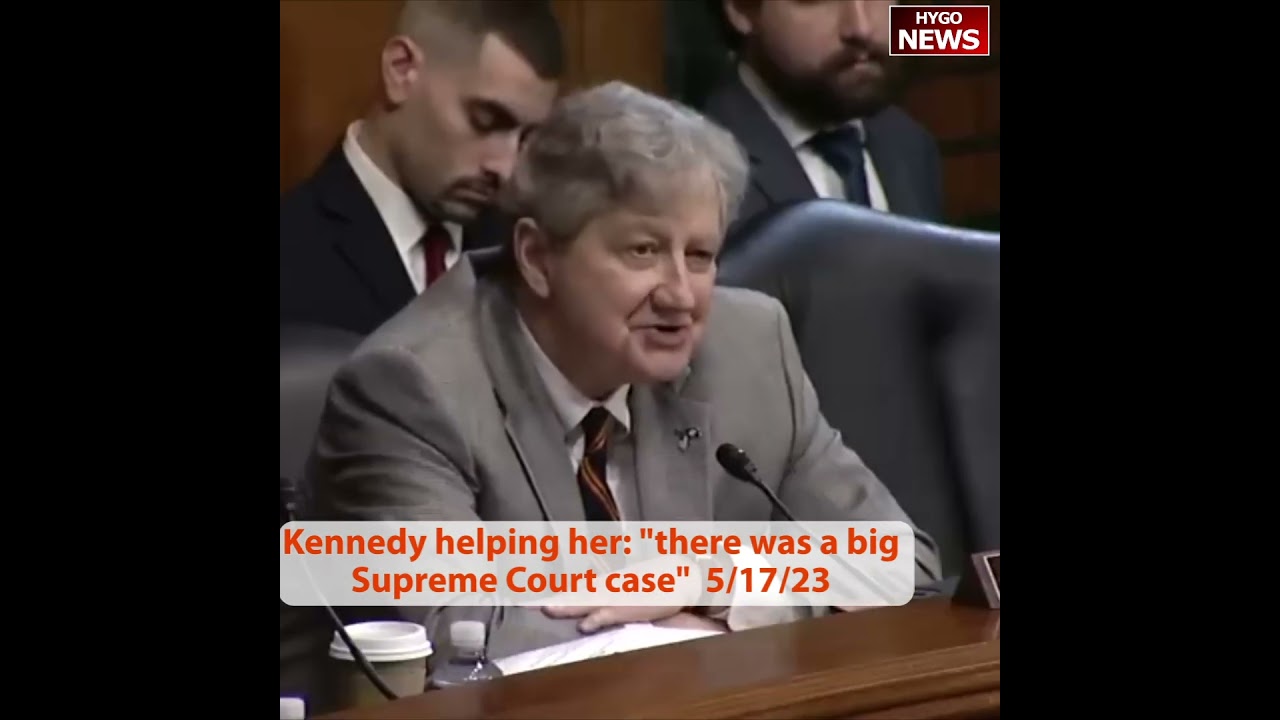#shorts Kennedy: Would that be legal?
de Alba: I would have to look at it a little bit more carefully. But, you know, on first blush, my concern would be that under Article 6, the U.S Constitution is the supreme law of the land, so we have to follow it. What if Florida said, under the state constitution, “We’re doing this. This is the Supreme is the U.S Constitution always… Are the Supreme Court’s interpretation of the U.S Constitution always prime a state constitution?”
de Alba: I have not dealt with that issue, and there’s a big case out of your state that deals with this issue. Are you familiar with the Pruneyard case?
Kennedy: The Pruneyard case?
de Alba: I am familiar with it.
Kennedy: Tell me the holding of that.
de Alba: The holding of that was it had to do with individuals who wanted to, um…
Kennedy: Yeah, but just tell me the holding. I remember the facts. Tell me the holding.
On 5/17/2023, GOP senator embarrasses Biden nominee for federal appeals court with basic question about Constitution. Sen. John Kennedy (R-La.) stumped yet another Biden judicial nominee with basic questions on constitutional legal doctrine. At a hearing to consider federal District Court Judge Ana de Alba for a spot on the Ninth Circuit Court of Appeals, Kennedy asked de Alba to explain the Dormant Commerce Clause doctrine and the Commerce Clause, which is found in Article 1 of the U.S. Constitution.
“This has been in the news a lot lately, and you’ll probably see it if you’re confirmed to the Court of Appeal. Tell me about the Dormant Commerce Clause,” Kennedy quizzed.
De Alba responded that she is only “somewhat familiar with the Commerce Clause,” indicating where to find it in the Constitution — but said nothing about the Dormant Commerce Clause.
Kennedy responded by helping her. He explained that “there was a big Supreme Court case” dealing with the Dormant Commerce Clause that just came out of California (which came from the very appeals court to which de Alba is nominated). De Alba then apologized for not being able to answer his question, justifying her knowledge gap by explaining that she has never dealt with it as a practicing lawyer or judge. She then promised to research it.
l
But things got worse when Kennedy asked de Alba to discuss the Commerce Clause broadly.
“So, my understanding about the Commerce Clause, like I stated, senator, is that it is under Article 1 of the Constitution, and it allows the legislature to create laws that allow for movement and things related to commerce in the United States and anything crossing state lines, things like that,” de Alba explained.
In follow-up questions, Kennedy asked “between whom” the clause permits Congress to regulate commerce.
“Between states, for example,” de Alba said.
“Anybody else?” Kennedy asked.
“It’s not coming to mind right now, senator,” de Alba admitted.
The Commerce Clause, found in Article 1, Section 8, grants to Congress the power to “regulate Commerce with foreign Nations, and among the several States, and with the Indian Tribes.”
The Dormant Commerce Clause doctrine, on the other hand, “refers to the prohibition, implicit in the Commerce Clause, against states passing legislation that discriminates against or excessively burdens interstate commerce,” Cornell Law explains.
Last week, the Supreme Court ruled in a case involving California Proposition 12, a state law that says pork products important into the state must meet specific animal welfare standards. The federal government challenged the law, arguing it violated the Dormant Commerce Clause. But the Supreme Court, in a 5–4 decision, disagreed, upholding the law.
other clips of this published longer video is here: https://youtu.be/wACYZMekWQk
Kennedy helping her: “there was a big Supreme Court case”

